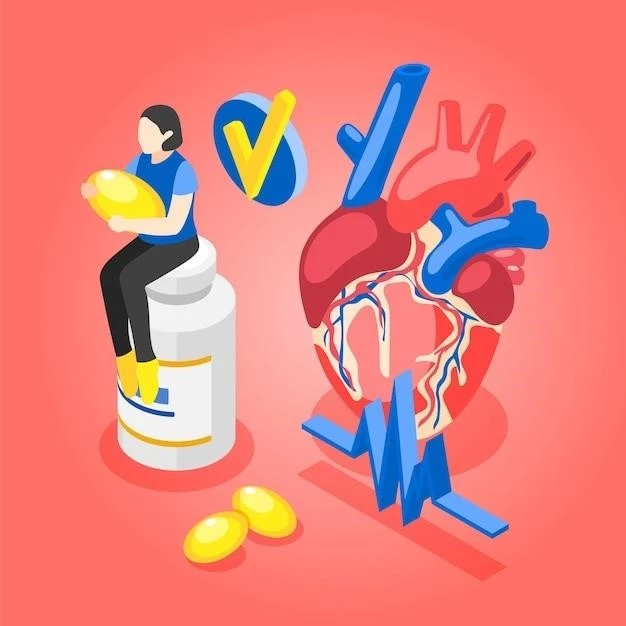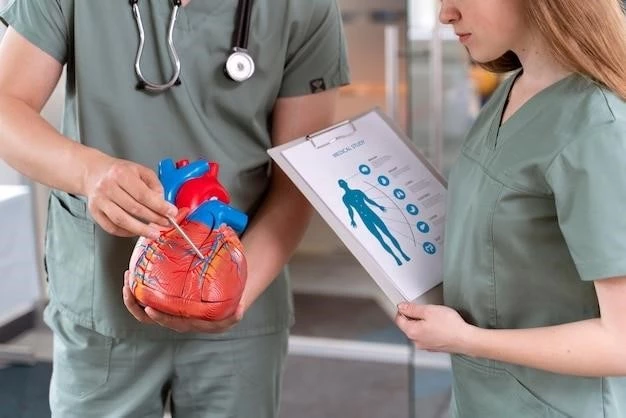Hypolipoproteinemia
Understanding Hypolipoproteinemia is crucial for managing lipid disorders effectively. Explore causes like genetic mutations affecting lipid transport and the impact on cardiovascular risk. Learn about cholesterol absorption‚ synthesis‚ and plasma cholesterol levels. Stay informed for better health!

Understanding Hypolipoproteinemia
Hypolipoproteinemia is a condition characterized by low levels of lipoproteins in the blood‚ often leading to hypocholesterolemia. Lipoproteins play a crucial role in lipid metabolism‚ including transporting cholesterol and triglycerides in the bloodstream.
Individuals with hypolipoproteinemia may experience familial hypobetalipoproteinemia‚ a genetic mutation affecting the production of low-density lipoprotein (LDL) particles. This can impact cholesterol absorption‚ synthesis‚ and overall lipid transport in the body.
Low levels of lipoproteins can affect plasma cholesterol levels‚ leading to potential cardiovascular risk. Understanding the mechanisms behind hypolipoproteinemia is essential for diagnosing and managing lipid disorders effectively.
Stay informed about the factors contributing to hypolipoproteinemia‚ such as genetic mutations and disruptions in lipid metabolism. By understanding the role of lipoproteins in the body‚ you can take proactive steps to maintain optimal cholesterol levels and reduce the risk of cardiovascular complications.
Causes of Hypolipoproteinemia
Hypolipoproteinemia can have various causes‚ including genetic mutations affecting lipid metabolism and lipoprotein deficiency. Familial hypobetalipoproteinemia is a hereditary condition linked to low levels of LDL particles‚ impacting cholesterol transport.
Other causes may include disorders affecting lipid synthesis or transport pathways‚ leading to reduced levels of circulating lipoproteins. Environmental factors like dietary choices and lifestyle habits can also influence lipid metabolism and contribute to hypolipoproteinemia.
Understanding the root causes of hypolipoproteinemia is crucial for effective management and treatment. Genetic testing and lipid profiling can help identify specific abnormalities in lipid metabolism‚ guiding personalized interventions to address the underlying mechanisms of lipoprotein deficiency.
Consult with healthcare professionals to investigate the potential causes of hypolipoproteinemia in your case. By identifying the underlying factors contributing to low levels of lipoproteins‚ you can develop a comprehensive approach to managing lipid disorders and optimizing cardiovascular health.
Role of Lipoproteins in the Body
Lipoproteins play a vital role in maintaining lipid metabolism and overall health. These molecules are responsible for transporting cholesterol and triglycerides in the bloodstream‚ facilitating their uptake by cells throughout the body.
Low-density lipoprotein (LDL) particles carry cholesterol from the liver to tissues‚ while high-density lipoprotein (HDL) particles transport excess cholesterol back to the liver for removal. Disruptions in this delicate balance can lead to imbalances in cholesterol levels and potential cardiovascular risk.
In individuals with hypolipoproteinemia‚ the reduced levels of lipoproteins can impact cholesterol absorption and synthesis. This can affect the body’s ability to transport lipids efficiently‚ leading to potential complications related to lipid metabolism and cardiovascular health.
Understanding the role of lipoproteins in lipid transport is essential for managing hypolipoproteinemia effectively. By promoting healthy lipid metabolism through lifestyle changes and targeted interventions‚ individuals can optimize their cholesterol levels and reduce the risk of cardiovascular disease.
Impact on Cardiovascular Risk
Hypolipoproteinemia can have significant implications for cardiovascular health due to its effects on lipid metabolism and cholesterol levels. Low-density lipoprotein (LDL) particles‚ responsible for delivering cholesterol to tissues‚ play a crucial role in the development of atherosclerosis.
Reduced levels of LDL particles in individuals with hypolipoproteinemia can lead to alterations in cholesterol transport and clearance‚ affecting the balance of lipids in the bloodstream. This imbalance can increase the risk of plaque formation in arteries‚ potentially leading to cardiovascular complications.
Individuals with hypolipoproteinemia may be at higher risk of developing conditions such as coronary artery disease‚ heart attacks‚ and strokes due to disruptions in lipid metabolism. It is essential to manage cholesterol levels effectively and address underlying lipid disorders to reduce the risk of cardiovascular events.
Monitoring cardiovascular risk factors‚ including cholesterol levels and lipid profiles‚ is crucial for individuals with hypolipoproteinemia. By working closely with healthcare providers to optimize lipid management and reduce the impact of low lipoprotein levels on cardiovascular health‚ individuals can improve their long-term well-being.
Diagnosis and Symptoms
Diagnosing hypolipoproteinemia involves assessing lipid profiles and evaluating lipoprotein levels in the blood. Symptoms of hypolipoproteinemia may not always be apparent‚ making regular lipid screenings an essential tool for early detection and intervention.
Individuals with hypolipoproteinemia may exhibit signs such as fatigue‚ weakness‚ or symptoms related to underlying conditions affecting lipid metabolism. However‚ the diagnosis is primarily confirmed through blood tests that measure cholesterol levels‚ lipoprotein concentrations‚ and lipid transport capabilities.
Healthcare providers may use genetic testing to identify specific mutations associated with familial hypobetalipoproteinemia or other genetic disorders impacting lipid metabolism. Additionally‚ imaging studies like ultrasounds or CT scans may be used to assess cardiovascular health and detect signs of atherosclerosis.
Early diagnosis of hypolipoproteinemia is crucial for implementing targeted treatment strategies and reducing the risk of cardiovascular complications. By staying proactive about monitoring cholesterol levels and lipoprotein profiles‚ individuals can take steps to maintain optimal lipid balance and support cardiovascular health.
Treatment Options
Managing hypolipoproteinemia typically involves addressing underlying lipid disorders and optimizing cholesterol levels to reduce cardiovascular risk. Treatment options may include lifestyle modifications‚ medications‚ and specialized interventions tailored to individual needs.
For individuals with hypolipoproteinemia‚ dietary considerations play a crucial role in maintaining healthy lipid metabolism. A diet rich in fruits‚ vegetables‚ whole grains‚ and lean proteins can support optimal cholesterol levels and overall cardiovascular health. Limiting saturated and trans fats is essential to manage lipid imbalances.
Medications such as statins‚ fibrates‚ or cholesterol absorption inhibitors may be prescribed to help regulate cholesterol levels and improve lipid transport in the body. In some cases‚ lipid-lowering medications may be necessary to address specific lipid disorders contributing to hypolipoproteinemia.
Regular physical activity is also vital for managing hypolipoproteinemia and reducing cardiovascular risk. Exercise can help promote healthy lipid metabolism‚ enhance cardiovascular function‚ and support overall well-being. Maintaining a healthy weight and avoiding smoking are additional lifestyle factors that can positively impact lipid profiles.
Consulting with healthcare professionals is essential to develop a comprehensive treatment plan for hypolipoproteinemia. By combining dietary modifications‚ medications‚ and lifestyle changes‚ individuals can effectively manage lipid disorders‚ optimize cholesterol levels‚ and reduce the risk of cardiovascular complications.
Research and Studies
Ongoing research and clinical studies are essential for advancing our understanding of hypolipoproteinemia and developing innovative treatments for lipid disorders. Researchers are investigating genetic mutations affecting lipid transport‚ cholesterol absorption mechanisms‚ and novel therapies to address lipoprotein deficiencies.
Studies focusing on familial hypobetalipoproteinemia aim to uncover the underlying mechanisms contributing to low LDL particle levels and their impact on cardiovascular health. By identifying specific genetic mutations associated with hypolipoproteinemia‚ researchers can pave the way for personalized treatment approaches tailored to individual genetic profiles.
Emerging research is also exploring the role of lipid particles in cholesterol synthesis‚ transport‚ and metabolism. Understanding the complex pathways involved in lipid homeostasis can lead to the development of targeted interventions to manage lipid disorders effectively.
Clinical trials evaluating the efficacy of new medications‚ lifestyle interventions‚ and dietary strategies for hypolipoproteinemia are crucial for improving treatment outcomes and reducing cardiovascular risk. By participating in research studies‚ individuals with lipid disorders can contribute to advancements in the field and access cutting-edge therapies.
Dietary Considerations
Managing hypolipoproteinemia through dietary choices is essential for supporting healthy lipid metabolism and reducing cardiovascular risk. A heart-healthy diet rich in nutrients can help optimize cholesterol levels and improve overall well-being.
Include foods high in soluble fiber‚ such as oats‚ legumes‚ and fruits‚ to help lower LDL cholesterol levels. Omega-3 fatty acids found in fish‚ flaxseeds‚ and walnuts can also support heart health by reducing inflammation and triglyceride levels.
Avoid saturated fats and trans fats found in processed foods‚ fried items‚ and baked goods‚ as they can raise LDL cholesterol levels and contribute to atherosclerosis. Opt for healthy fats from sources like olive oil‚ avocados‚ and nuts to support lipid balance.
Eating a variety of colorful fruits and vegetables can provide antioxidants and phytonutrients that promote cardiovascular health. Incorporate lean proteins like poultry‚ beans‚ and tofu into your meals to support muscle strength and overall well-being.
Stay hydrated by drinking plenty of water and limit sugary beverages and excessive alcohol consumption. Be mindful of portion sizes and aim for balanced meals to maintain a healthy weight and support optimal lipid profiles.
Consult with a dietitian or healthcare provider to develop a personalized eating plan that meets your nutritional needs and supports lipid management. By making conscious dietary choices‚ you can positively impact your cholesterol levels and reduce the risk of cardiovascular complications associated with hypolipoproteinemia.
Lifestyle Recommendations
Implementing healthy lifestyle habits is crucial for managing hypolipoproteinemia and reducing cardiovascular risk. By making positive changes in your daily routine‚ you can support lipid metabolism‚ optimize cholesterol levels‚ and improve overall well-being.
Engage in regular physical activity such as brisk walking‚ jogging‚ cycling‚ or swimming to promote cardiovascular health and enhance lipid metabolism. Aim for at least 150 minutes of moderate-intensity exercise per week to support heart function and maintain a healthy weight.
Avoid smoking and limit exposure to secondhand smoke‚ as tobacco use can raise LDL cholesterol levels and increase the risk of heart disease. Quitting smoking can lead to improvements in overall cardiovascular health and reduce the impact of hypolipoproteinemia on lipid profiles.
Manage stress through relaxation techniques like deep breathing‚ meditation‚ yoga‚ or mindfulness practices. Chronic stress can contribute to elevated cholesterol levels and impact lipid metabolism‚ so finding healthy ways to cope with stress is essential for cardiovascular health.
Prioritize quality sleep by establishing a regular sleep schedule and creating a relaxing bedtime routine. Adequate sleep is essential for overall health‚ including lipid metabolism and cardiovascular function. Aim for 7-9 hours of quality sleep per night to support optimal well-being.
Work with healthcare providers to develop a comprehensive lifestyle plan that addresses your specific needs and supports lipid management. By incorporating healthy habits into your daily life‚ you can reduce the risk of cardiovascular complications associated with hypolipoproteinemia and promote long-term heart health.
Conclusion and Future Outlook
In conclusion‚ hypolipoproteinemia presents challenges related to lipid metabolism‚ cholesterol levels‚ and cardiovascular risk. Understanding the impact of low lipoprotein levels on overall health is crucial for managing this condition effectively and minimizing the risk of heart-related complications.
By addressing underlying lipid disorders through a combination of dietary modifications‚ medications‚ lifestyle changes‚ and regular monitoring‚ individuals can take proactive steps to optimize their lipid profiles and support cardiovascular health.
Looking ahead‚ ongoing research and advancements in the field of lipid metabolism offer hope for improved diagnostic tools‚ treatment options‚ and personalized interventions for individuals with hypolipoproteinemia. By participating in research studies and staying informed about the latest developments‚ individuals can contribute to the future of lipid disorder management.
Remember to prioritize heart-healthy habits‚ such as maintaining a balanced diet‚ staying physically active‚ managing stress‚ getting quality sleep‚ and avoiding tobacco use. By taking control of your lifestyle choices and working closely with healthcare providers‚ you can effectively manage hypolipoproteinemia and strive for better heart health in the years to come.
Stay informed‚ stay proactive‚ and prioritize your cardiovascular well-being. With dedication‚ support‚ and a focus on healthy living‚ you can navigate the challenges of hypolipoproteinemia and work towards a healthier future.
